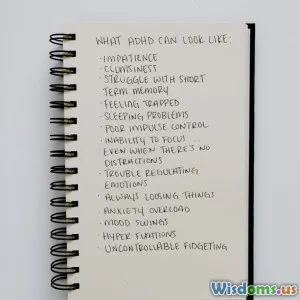
How to Improve Your Self Regulation Skills
8 min read Unlock your potential by mastering self-regulation skills with actionable strategies grounded in psychology and neuroscience. (0 Reviews)
How to Improve Your Self Regulation Skills
Self-regulation is often the silent cornerstone of success and well-being. Imagine having the ability to pause before reacting, stay focused despite distractions, and guide your emotions instead of being ruled by them. This mastery doesn’t just magically appear—it’s a skill that you can cultivate. Whether it’s resisting that tempting snack, managing anger in stressful moments, or sticking to a long-term goal, improving self-regulation can radically transform your life.
In this article, we’ll explore what self-regulation truly means, why it matters deeply, and—most importantly—how you can develop powerful self-regulation skills through practical, research-supported methods.
Understanding Self-Regulation: The Psychological Backbone
Self-regulation refers to the ability to control or redirect disruptive emotions, impulses, and behaviors and to adapt to changing circumstances to achieve long-term goals. Psychologists describe it as a dynamic process involving the management of thoughts, feelings, and actions. It is not about suppressing emotions but rather managing them wisely.
Neuroscience highlights the role of the prefrontal cortex—our brain’s 'executive control system'—in enabling self-regulation. Higher activity and connectivity in this area correlate with better impulse control and emotional regulation.
Real-world insight: Walter Mischel’s famous “Marshmallow Test” showed that children who delayed gratification by resisting an immediate smaller reward (one marshmallow) to gain a larger reward later (two marshmallows) tended to have better life outcomes, including higher academic achievement and healthier relationships. This test is a classic example demonstrating the power and long-term benefits of strong self-regulation.
Why Self-Regulation Skills Are Vital
Poor self-regulation is linked with various negative outcomes, such as chronic stress, impulsivity, unhealthy habits, and difficulties in social and professional realms. Conversely, high self-regulation is a predictor of resilience, academic and career success, healthy relationships, and overall subjective well-being.
For instance, a 2011 study published in the Journal of Personality found that individuals with stronger self-control not only gained better academic grades but also exhibited better mental and physical health throughout their lives.
How to Improve Your Self-Regulation Skills
1. Cultivate Mindfulness and Emotional Awareness
Mindfulness practices—such as meditation, deep breathing, or simply paying close attention to your feelings—can tremendously boost self-regulation. They help increase your awareness of emotional triggers before you act on them impulsively.
- Example: Before responding to a frustrating email, take three deep breaths to check in with your emotional state.
- Research insight: A study in Psychological Science found mindfulness training significantly enhanced participants' ability to delay gratification and control emotional reactions.
2. Set Clear, Manageable Goals
Goals act as a roadmap for behavior. To effectively self-regulate, set specific, achievable goals with clear steps. This approach reduces decision fatigue and helps maintain focus.
- SMART goals (Specific, Measurable, Achievable, Relevant, Time-bound) are particularly effective.
- Break larger goals into small, actionable tasks to create consistent momentum.
3. Build Healthy Habits Through Environmental Design
Your environment heavily influences self-regulation. By designing your surroundings to minimize temptations and distractions, you conserve mental energy for self-control.
- Put away your phone when working to reduce digital interruptions.
- Store unhealthy snacks out of immediate reach or remove them entirely.
Real-world example: Researchers at the University of Cornell found that people eat 30% more popcorn when using larger bowls—a demonstration of how environment cues affect self-control.
4. Practice Deliberate Delay and Pausing
When faced with temptation or negative emotional impulses, deliberately pause before acting. This moment of reflection creates a window for rational decision-making.
- A simple technique is the “10-second rule,” where you count to ten silently before reacting.
- This helps activate the prefrontal cortex and reduce impulsive behavior.
5. Utilize Cognitive Reappraisal Techniques
Changing the way you interpret a situation can diminish its emotional impact.
- For example, viewing a critical comment as constructive feedback rather than a personal attack helps regulate emotional distress and maintain composure.
- Cognitive-behavioral therapy (CBT) methods teach this skill, proven effective in regulating emotions.
6. Prioritize Sleep and Physical Activity
Sleep deprivation impairs the brain’s executive functions, reducing our ability to self-regulate. Similarly, regular physical activity enhances mood regulation and cognitive flexibility.
- Aim for 7–9 hours of quality sleep per night.
- Incorporate moderate exercise at least 3 times per week.
Data insight: Studies show that sleep deprivation reduces impulse control by up to 40%, underscoring the necessity of rest for self-regulation.
7. Strengthen Self-Regulation Like a Muscle
Self-control is a finite resource that can be depleted but also strengthened over time with practice, much like a muscle.
- Start with small challenges, such as avoiding junk food for a day.
- Gradually increase difficulty to build stamina.
Research by psychologist Roy Baumeister suggests engaging in self-regulation exercises daily can increase overall willpower and control.
Real-Life Case Study: Barack Obama’s Self-Regulation
Former U.S. President Barack Obama is often cited for his remarkable self-regulation skills. Known for his calm demeanor under pressure, Obama employed mindfulness and deliberately paced decision-making even during highly stressful moments. He famously practiced breathing exercises and took quiet moments to reflect before addressing controversies or making crucial policy decisions.
This poise wasn’t accidental but the product of conscious efforts to regulate impulses and emotions effectively.
Conclusion: The Road to Mastery
Improving self-regulation is a transformative journey that enhances not just your personal growth but your relationships, career, and overall happiness. By understanding the science behind it and committing to practical strategies—mindfulness, goal setting, environment design, pausing, cognitive reframing, proper rest, and regular practice—you empower yourself to respond consciously rather than react impulsively.
Remember, self-regulation is not about perfection but progress. Each mindful decision to pause, reflect, and choose deliberately strengthens your inner control system, leading you to a more intentional, fulfilled life.
Take the first step today: notice one moment where you can delay an impulse and instead choose a response aligned with your goals. That small act marks the beginning of greater mastery over yourself and your future.
Rate the Post
User Reviews
Popular Posts



















